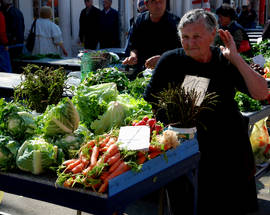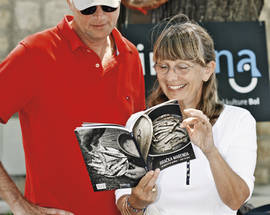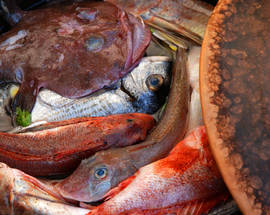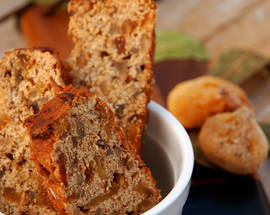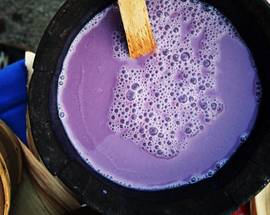HIT THE MARKET!
When it comes to food the people of Dalmatia like to have theirs simple, fresh and grown locally. There are no exotic spices or complex preparations, just natural flavours. And boy, do they taste great. In Split there is no shortage of fantastic ingredients, and there is no better place to get them than the local farmers’ market and fish market, or as Splićani call them, Pazar (Pah-zar) and the Peškarija (Pesh kah ria).
Now, in the mind of a foreigner it would be logical to keep these two close, but they are at exactly the opposite ends of the Riva, the main thoroughfare that runs along the quayside. This is mainly due to the fact that the peškarija is close to the former fishing port of Matejuška, while Pazar is near to one of the main roads since most of the veg is grown inland. The good thing is that Pazar is very close to the bus station and the ferry port, so if you can spare a few minutes before leaving for your favourite island you can stock up on veg since it’s at least three times more expensive on the islands. Aside from its practical uses, Pazar is one of those places where the local population and pleasure-seeking tourists tend to mix without prejudice.
It’s a gathering place for people from islands like Brač, Hvar and Šolta, for the mountain people of Dalmatinska Zagora and for people from smaller local towns like the seven Kaštelas. All of them bring their produce to the concrete benches in the shade of the eastern wall of Diocletian’s palace. Here you can find everything that grows under the sun, from strawberries, fresh or dried figs, lemons, grapes and pomegranates to wild asparagus, sun-ripened and sweet-smelling tomatoes, plus all kinds of green leafy veg like spinach and chard, aubergines, carrots, courgettes, goats’ and sheep’s cheeses, homemade jams and preserves, liqueurs and brandies, cured meats and fresh poultry. It’s a veritable cornucopia of flavours and colours, garnished with the lively banter of the sales people who are hoping to persuade you to taste their goods and buy their products. Some of these market sellers have been feeding the Splićani for generations.
Depending on the time of day you arrive, Pazar can be quite an overwhelming experience, so it’s sometimes wise to buy a cold beer at a nearby kiosk and join the locals in the shade waiting for the prices to go down towards the end of the day. Now you’ve got all of your meat and veg and some wine and brandy, it’s time to pick out a nice piece of fish at the fish market.
The peškarija is located smack bang in the middle of Marmontova, the nice marble-paved street at the western end of the Riva. You must have seen it or at least smelled it out. No worries, due to the sulphur wells that brought Diocletian here, the air here keeps the fish hygienic as there are no flies. The fish market opens early, with the morning catch coming in even before 07:00, so set an alarm clock if you want the best pieces to end up on your grill. Dalmatian people do not eat expensive fish like dentex, john dory or the other prize catches. These all go to restaurants or tourists. Locals prefer cheaper, smaller fish like sardines, anchovies, bonito, squid, seabream, mackerel and red mullet. These fish are not only easy on the pocket, they’re tasty and healthy too – the benefits of oily fish like sardine and mackerel are renowned.
Feeling a bit nervous about buying fresh fish? Just look for shiny scales, clear eyes and firm flesh.
Check the gills too, which should be bright red. Now you bought it, you will have to gut it. Gross? Ask the person behind the counter, if they’re not too busy they might oblige. If not, best stick to the restaurants.
Jump to:
Local Dishes
Chock-a-block with all this food and influences from various parts of Dalmatia and Croatia, Split is rich in simple tasty dishes you have never heard of but once you taste them you will never forget. So, how do you go about tasting all this if you don’t have the good fortune of being invited to someone's house where mama will surprise your taste buds? One option is to go exploring among the many konobas (traditional eateries which used to be wine cellars where you could slice some pršut and cheese or eat salted anchovies after a hard day’s work). You’ll find these kinds of restaurants scattered around the old city and the market.Another option is to schedule your visit around the many gastronomic events happening all summer around Split, most of them based on a certain dish or ingredient. What sort of dishes should you look out for? It depends on the season. Local people tend to stick very much to what’s around at a given time of year rather than relying on greenhouse-grown produce or imports. So, in the spring, look out for dishes made with artichokes or for young broad beans prepared in a million different ways, for example with lamb, with squid ink… Mmm, it makes us hungry just thinking about it.
Also watch out for divlje zelje, greens picked in the wild. Summer is a great time for a piece of fresh fish simply grilled and served with chard cooked with potatoes; a black squid ink risotto with a refreshing green salad, or the classic family meal of deep fried sardines, red mullet or anchovies and a tomato and cucumber salad. In cooler seasons meat comes more to the fore, often cooked with vegetables in a stew-type dish. Look out for aramabašići a speciality originating in Sinj, a little way inland. These are little soured cabbage parcels containing beef (and sometimes pork), cooked in a broth with smoked dried meats. These, or their cousins sarma, are a must at every special occasion, as is a spit-roast lamb. If you keep out a sharp eye you might come across a pogača hailing from the island of Vis or Hvar, a flattish breadcake containing a mixture of salted anchovies and onion, plus tomato, capers and herbs depending on the version.
Or from inland, look out for soparnik, a flatbread stuffed with chard and spring onions, scattered with garlic and almonds and drizzled with olive oil. These are specialities you might find on sale at Pazar market. On a sweeter note, look out for compressed cakes of dried figs (smokvenjak), commonly made at home and truly delicious.
A speciality from the island of Hvar is forski medenjak, a biscuit made with olive oil and honey. And if you are in Trogir, look out for rafiole. These are little half-moons made from almonds and maraschino liqueur. Legend has it they were invented by a girl named Rafiola who was imprisoned in the Kamerlengo fortress until her love, a Trogir noble, came to rescue her. She baked him these little cakes ‘til the end of her days as a mark of her gratitude.
Pazar - A Personal History
Siniša Pavić grew up in Split and now lives in Zagreb. He shares with us his memories of Pazar, Split's legendary marketplace.- Everyone has their favourites, everyone knows who has which spot on Pazar, which goods are sold where, and some things have become conventional wisdom, for example that the best greens are from Podstrana, the best soured cabbage is from Glavice near Sinj, and the best citrus fruits are from the islands... You can learn to be an expert in recognising the best produce, organically grown and sold by the person who grew it. If the lady behind the table has dirt under her fingernails that's a good sign, it means that she's been working the land.
- If you want the best prices come later on. 'Cause at the end of the day, they sell everything cheaper just to get home. But they won't give it away for free.
- Once upon a time you had to cross a small bridge to reach Pazar, Split's marketplace. Right alongside Pazar ran a railway track, which they later closed down. Along its route now stand kiosks selling piles of goods, clothing, shoes and a few food items. At one time on this bridge people used to exchange money on the black market (mostly German marks), as well as cigarettes, and jeans – which you couldn't buy anywhere else. In the morning people would gather here eager to work, day labourers, and here alongside Pazar others would buy goods from farmers only to sell them on an hour later.
- Haggling!? To be honest, you've got to have guts and talent for that. But experience shows that here, in true Mediterranean style, the stallholders are suckers for charm. A few kind words and who knows, alongside the head of lettuce you set out to buy you might get one free!
The Pazar of My Childhood
Pazar! The stomach, the belly, the guts of the city! The Pazar of my childhood, even though, my father says, it's changed little over the years. It's still endlessly colourful, full of melodious sound as the ladies behind the tables shout over each other to bring in the buyers. Here are the smells of life, unbeatable scents, of cabbage souring in barrels, smoky dried meat, unwaxed oranges that spray out juice as you run your fingernail over the skin. It's the same, but different, different because when you're small everything's different, and when you grow up everything is more or less sentiment. When you grow up you realise: it was the university of life, of gourmets, of gluttons, of epicureans, of deliciousness.
....
My father used to set off for work at dawn, my brother was small and my mother was a solicitous mother who tried to squueze everything in despite working morning shifts one day and afternoon shifts the next. It turned out that those inconvenient hours had their bright side. Because she couldn't make it, it would often be me who headed off to Pazar for our groceries. Probably my puppy fat and my evident satisfaction while eating convinced my mother that I could do no wrong. And I wasn't half bad. She would hand me a list, and I'd have the freedom to wander around the tables, weighing up the fruit and vegetables, careful not to fall for the honeyed tones of a mountain accent which reminded me of my grandparents, or the equally mellifluous island dialect. What gave my role even more importance was the fact that my mother would give me just enough money to ensure that if I spent wisely, a couple of dinars (that was the currency in those days) would be left over, so that after two or three trips to Pazar I'd have enough for a comic. Even such a young age it was worth being shrewd, being satisfied with a cheap ice cream from the old-fashioned machines and remembering the important things from the headlines Ante called out when selling the newspapers – the things that were important indeed because they were the reason why people bought newspapers. A small boy could feel awfully big carrying bags of groceries home from Pazar. And awfully proud when the next day his classmates would pinch his sandwich with the hunter's salami, which you could only buy in the kiosk at the bottom end of Pazar. And endlessly flattered when his mother first said to him, «Come on, let's take a walk at the fish market.» The Peškarija, the fish market, a mythical place which you just have to stroll by, you don't have to buy a thing. It's enough to catch the scent and know that you're a part of that sea, that land, that city.
....
To leave Pazar, to leave for the big wide world was easy at first. When you're a strapping teenager those things don't seem to matter. There are Pazars in other places, you think naively. But there's always some connection, it's alive as long as your mother tells you during an evening phonecall about today's catch, or she tells you how you can now buy soparnik, that miraculous delicacy dreamed up by the poor people of the hinterland, by the slice, but it's not even close to the one my late grandmother baked in her fireplace.
However good those replacement markets might be, however colourful and full of scent, it's now clear that I miss that passion, that uncertainty whether a kuna will be left over for a comic, and I miss those shouts in dialects which my officially-proscribed accent never picked up.
«Why must they shout so?», I remember she asked when she first realised that in Split, on the market, you can't buy less than half a kilo, and nobody with any sense even asks. It's embarrasing, for goodness' sake, and they give you a good ticking off, even if you're the daughter of the President himself. And what seemed to her like rudeness was for me the best poem ever, the best song.
While you sing the praises of their greens they praise your youth and good looks, even if it's clear that you left your youth and good looks somewhere by the kiosk with the hunter's salami. It's the same game wherever you go. Wherever you end up you try to cook sauce so it tastes just the same as that small boy remembers, who knew no greater satisfaction than to arrive home from school, break off a hunk of bread and dip it right into the saucepan before his mother caught him.
....
- «Dad, has anything changed?» asks the emigré son, himself now a father.
- «Almost nothing», says Dad.
Almost nothing. Tell the youth of today that there are oranges and oranges, those from the supermarkets and those on the tables at Pazar, and how they are nowhere near the same thing and how they can't be, even though their mother tells them there's no difference. To have your own stallholder for eggs, a lady for chard, a butcher who won't cheat you. A lady at the fish market who'll give you a barely discernable nod to show which fish is fresh and which isn't... That's a matter of survival, of growing up, of evolution. Pazar, the fish market, coffee, newspapers. Confound it, that's it. There's no recession, no accounting law, no minister of finance who can take it away. As long as there's the human race there will be Pazar!
Marenda & Bevanda
If your travels take you to the coast, to the Dalmatian towns and cities, to Split especially. If you end up at some tavern and if you see that at one of the tables sits a group that at the same moment are talking loudly and are chewing a mouthful of delicious food, do not be afraid - they are only eating marenda!Marenda is not, what it may seem at first, just satisfying a person's need for food. It is a whole lot more, a population's habit, which you need to see through a window. Because, when a group of friends gather together, in the early morning, and sit down at a table with a full plate, it is difficult to discern whether they have gathered for the delicacies, or if they made their way around the delicacies in order to make their conversation more comfortable and friendlier, so that they can return back to their jobs easier, which they fled, for marenda, for a moment. However, the modern age has changed everything, and we fear that marenda will be put to an end.
Marenda to Dalmatians is what five o'clock tea is to the English. The time you spend waiting for marenda you're like a locked and loaded gun, whether you're a first grader who likes to eat, or a mature man. Marenda time could pay tribute to the modern world in which we live. Marenda has always taken place somewhere between ten o'clock in the morning and noon. By ten, let alone by noon, the working class would have starved a hundred times, and when this hunger is combined with Mediterranean casualness, then you can enjoy. You can still eat everything at this meal- from tripe and pašta fažol (Dalmatian beans with pasta), to polpeta u šugu (meatballs and sauce) and manistra usuvo (spaghetti and meat sauce), to boiled meat and fried sardines and even veal shank. Modern times, however, have moved the time of marenda. Today, there are less and less workers, the employed individual eats later and often eats alone, and there are less taverns and more restaurants. Delicacies are, however, the same, and tripe and fažol, and polpete u šugu and minestrone usuvo, and boiled meat and fried sardines, as well as veal shanks. Is marenda threatened to become extinct, when it is not protected as an intangible UNESCO good!?
The time to have marenda is important, but the marenda spirit is even more important! Marenda is not only about eating, marenda is about socializing. It's a group that binds a lot more than just food. The group is held together in a wondrous, intimate, and almost conspiratorial way, a group that has a sense of humor, the same joke, and with all that also loves rustic and homemade food.And that's the truth, and the most important thing you need to know about marenda.
If you are this type do not hesitate when you see in a tavern a group which is enjoying their meal. In fact, they themselves will recognize in you that goodness and openness and good food, and will embrace you as their own. So that there is tripe and pašta fažol, polpeta u šugu and manistra usuvo, boiled meat and fried sardines, and even veal shank.
And when you've already left for marenda, it is quite possible, if not mandatory, that along with your meal you will drink a bevanda. Yes, maybe some will think that mixing wine and water is blasphemy and a sin, but it is an ancient custom for farmers to dilute wine to quench their thirst. Today individuals know much more about good wine and they try not to dilute it as much. But, after marenda if you want to explore the cities and towns of Dalmatia, in the sun, it is not wise to drink strong Dalmatian wine. Drink bevanda and everything will seem different, better. Since, bevanda is also a part of Dalmatian "five o'clock tea." However, here we simply call it - marenda!


